- Home
- M G Vassanji
The Gunny Sack Page 12
The Gunny Sack Read online
Page 12
I learnt that a man brought me out of that inferno.
Jenny Auntie was a witch. She tried to take poor, simple Rehman Uncle away from his mother. But Rehman was a good son and he was strong. So Jenny Auntie in revenge tried to take me away and give me to Timbi Ayah. But I knew Timbi Ayah’s name even if I could not say it aloud. Perhaps that had saved me. Shamim and I on the lorry tire debated over this long afterwards. And we took the beautiful fan and dropped it into the other blackness where maggots crawled in pungent juices of human excreta.
That Sunday evening, as we walked up and down the seashore several times, Jenny Auntie had given Rehman Uncle an ultimatum: either after marriage they lived in a separate flat, downtown, alone, or the engagement would be off.
I didn’t see Jenny Auntie for a long time. Perhaps they kept me hidden from her, Kulsum and the rest. I never saw her, until I forgot what she looked like—except that she was slim and fair and pretty.
Breakfast was a prolonged, indefinite affair in that house. Early in the morning someone—my grandmother or my young aunt Zarina—set up the table. By the time the children had been dragged out of bed there was already a small circle of adults chatting and drinking tea around it. The shop was open, manned by Grandmother and the servant. At this time spirits were high and everybody talked loudly and called out. The dining area was the veranda, which opened into the backyard and was almost filled by the long, dark brown table and the chairs and bench. Two to three sufuriyas of tea were cooked on the coal stove, which was brought right into the yard so an eye could be kept on it. We breakfasted on loaves of soft, steaming white bread, washed down noisily with sweet, thick tea from porcelain mugs. Sometimes we had sweets bought from the African girls who vended them in the street outside, and occasionally my Aunt Zera would make a philanthropic swoop on our breakfast table, bringing jelebis and ladoos in oily brown paper bags. It was breakfast time also beyond the corrugated-iron wall that separated our yard from the African houses behind. Woodsmoke rose from that area and also the sound of African women and children. Grandmother knew them and sometimes ordered the maandazi from them. We breakfasted till way into mid-morning. The adults were up one by one within a few minutes of each other, starting to clean and sweep the rooms and dressing up, beginning their daily chores, and the children lingered on, clambering up the table, spilling tea and food on the floor. Flies droned with pleasure there, indulged by the sun, which lit the veranda in the early morning then would rise up and bring cool shade. We left this happy place only when the table was wiped clean, and my sister and cousins came armed with brooms and wet rags. The solid wooden table always carried with it the smell of breakfast, the stickiness of sweet and strong tea and evaporated milk from Holland.
It was from my cousin Shamim that I learnt we were finally to leave that house. She who told me about Red Riding Hood and Cinderella and Hansel and Gretel, and Timbi Ayah’s real name, who would take me aside by the hand and say, “Sit,” and sit down with me on the veranda step or the large tire in the backyard, who when I got restless and began to stand up would keep my hand pressed down and raising a forefinger begin, “Listen. Once upon a time,” in English and then mixed with Cutchi and Swahili tell me a story, said: “Listen. Your family is moving to a new house.”
“Is it in Nairobi?” I asked.
“No. In Dar es Salaam.”
“Whereabouts, then?”
“Somewhere. In a new building. With a terrace. On the second floor.”
“Are you coming with us? I want you to come with us.”
“Then you must tell your mother.”
HABIB MANSION.
Kulsum standing outside her shop every morning, eyes half closed over the tasbih, briskly threading her hands, whispering the sacred formula for good luck before she opens the first of several padlocks on the door, as the servant and the tailors wait nearby.
The beginning, the traditional beginning, Kulsum’s beginning: always with the Bismillah, the Name, or the nad-e-Ali for more dire straits … for it is related that in the Battle of Khyber when the Prophet, on the verge of defeat and in despair, uttered this prayer, Imam Ali the Favourite appeared on his horse Dul Dul with his mighty three-edged sword Zulfikar, and he came and supported the bridge with his bare hands for the army of the righteous to cross over to victory.
So much on the strength of a prayer, a name.
Habib Mansion, into which we moved, was on the corner of Kichwele and Viongozi Streets, two blocks away from the no-man’s land of the Mnazi Moja grounds. It was the newest two-storey concrete building on the Kariakoo side of Kichwele, having taken the place of the mud and limestone and corrugated-iron shop-house. A yellow corner building with a roof terrace, a symbol of patient acquisition of wealth, of squeezing a stone dry, as Hassan Uncle would later say. With Habib Mansion the development of the Kichwele/Viongozi intersection became complete: there were on the remaining three corners, Salama Building, and Anand Bhavan, and Mzee Pipa’s Amin Mansion.
Kulsum had paid handsome goodwill money for the choice location, the corner store open on the two fronts to the two streets and a display window, a showcase, between them. Every store had a name, painted by Khaki (modest) or Rex (expensive) or an anonymous African (cheap) painter. Begum and the others were all for the name The Curiosity Shop, culled from some school book, but the voice of my uncle Hassan, Kulsum’s adviser then and later on all matters relating to business, intervened impatiently. Hassan Uncle’s long face became longer when it expressed contempt. The mouth stayed open, having said what he wanted to say, his eyes widened and his body arched backwards as if that was the only way he could get a proper perspective of your silliness.
“What curios? Where are the curios, eh? Choose something people can see. Okay, Bai, tell me. What will you sell?”
Kulsum had in mind the stores of Nairobi’s Indian Bazaar, to which even the European ladies from the Highlands dropped in, where you could satisfy the most exacting requirements, from a needle with the tiniest eye to the freshest shipment of chiffon and nylon and georgette from England. “Fancy goods, brother,” she said, “I want to sell fancy goods.”
The signmaker was asked to paint over Curiosity, and The Fancy Shop it became, and Hassan Uncle rode away on his bicycle satisfied at his achievement.
Every family has a nickname, usually describing some member of the family, so you are so-and-so’s brother or of the so-and-so family. But there are no strict rules about nicknames. You could get one for the oddest of reasons: for your looks, for what you said once, for what someone spoke about you, for your occupation: or for no apparent reason at all. A public blunder is sufficient to brand you for life and perhaps for the next generation too. When you move into a neighbourhood, you wish in your heart of hearts, above anything else save for good business in your shop, for a nice nickname.
Parmar Tailoring Mart was next door to the Fancy Shop. Parmar was simply Parmar; no nickname: a stranger, however familiar his face, who cycled in every morning from the Hindu village in Kisutu, where he probably already had a nickname. Next to him was Roshan Mattress, named after her shop and her body.
Of fat women, the expert lady-watchers of Kichwele and Viongozi all concurred there are those that are ugly-fat and those that are beautiful-fat. Roshan Mattress was of the latter sort. Plump really, rosy and fair, soft but not sagging flesh in all the right places, beautiful in the classical sense though obese (what a term!) in the modern, Westernized sense. When she flaunted those haunches, swinging her hips on her way to throw a taunt or two at Mzee Pipa, the more lewd bystanders would pick their crotches in muted satisfaction—for this was all they would get, the real thing was reserved for a certain police inspector, Kumar, no person to mess around with.
Mzee Pipa, Old Barrel, was the oldest resident on the corner. In Anand Bhavan was short, fiery Nuru Poni the pawnbroker who also wrote letters to the Editor; his store was next to Moonlight Restaurant, which belonged to an Arab. Salama Building boasted Daya’s wife, the rumour-mo
nger, and the Mawanis, whose son Snivelling Alnasir was my classmate.
Thus was constituted, in the main, the corner of Kichwele and Viongozi, also called the Pipa Corner after its most illustrious resident. You could miss knowing where Viongozi was, because all streets that took off from Kichwele looked alike, the downtown visitors insisted, but everyone knew the corner with its small “keep left” where Mzee Pipa kept shop.
Mzee Pipa, Nurmohamed Pipa, would descend the stairs every morning to his shop, fat and weak-legged, leaning on the shoulder of a servant, wheezing and coughing all the while, suffering from some interminable disease which might just as well have been the condition he lived in. His was also a corner store and our entrances on Viongozi faced each other. All day long he would sit in a white singlet and a worn-out loincloth, perched on a car-seat atop a wooden crate, so that surrounded by all his wares, he looked on the two streets. Crates heaped with grain and spices formed an uneven checkerboard facing Kichwele on one side; a wood-topped counter with a fly-specked glass front, containing old yellowing items, closed off most of the other side, leaving a small passageway behind him. Tufts of grey hair jutted out from under his soft, fat arms. His uncovered chest was a jungle of grey hair, his layered chin had a white stubble, his white head was cropped close. He looked sweaty and dirty, a part of his shop; it seemed you could rub layers and layers of turmeric or coriander, or whatever else he sold, off his skin, he breathed in and breathed out nothing but musty air with the odour of grain and spice, gunny and cockroach egg. Inside, the store was dark and cool. A large and dirty green tarpaulin sheet hung from an awning on the Viongozi side. Behind him were stacks of old newspapers—News of the World, the Illustrated London News, the Observer—for sale by the pound to neighbouring stores. Behind the papers were gunny sacks filled with grain, and behind these, in the storeroom, was complete darkness, where no light, natural or electric, ever reached, where only the servant ventured. There were cupboards on the walls that had not been opened for years. On the door of one of them was a faded sign showing two pictures side by side: one, a man at his desk, holding his head in despair, his safe open and spilling over with useless scraps of paper and rats running amok among them, with the caption: “I sold on credit”; the other, a smug gentleman counting money in a neat office: “I sold for cash.” Both English gentlemen looked upon scruffy Mzee on his car-seat, selling for cash, not giving anything away. Scrooge in Kariakoo. His hands would be in continuous motion. He would put a handful of spice or gum on a piece of square paper, then fold it rapidly, twice, to make a cone, then a third time, and finally tuck the remaining edge in and throw the finished packet into a basket. It would fetch ten cents from some African woman out to buy the day’s groceries. Ten cents collected in a rusty metal tray with a handle, and deposited into the wooden cashbox that stood under his eyes next to his stomach in front of him on a table. Drop by drop, they said, you can fill an ocean. With clink after patient clink of ten-cent coppers in the cashbox he had acquired his wealth, brick by brick Amin Mansion had gone up over the mud and lime dwelling on Kichwele and Viongozi, named after Amin the son who came after a curse of seven daughters patiently suffered through, all now married.
Oh yes. Our nickname. Pipa Corner was kind to us, we were new and had committed no great folly yet. We were all named after Begum, whom we ourselves sometimes called King George’s daughter. They called Begum “Nairobi”; and sometimes, for her imperious ways, “Victoria.” In Kichwele they denoted more or less the same thing. Of course, any name can be used with a contemptuous twist. Instead of saying, She is like Victoria (a queen), they could (and did) say, She thinks she is Rani Victoria. Hunh.
There was a feud on in Pipa Corner, between Pipa’s wife and Roshan Mattress, a quiet heat that remained of an old quarrel, which from time to time rekindled.
In the days before Habib Mansion and Amin Mansion and the other brick buildings went up on the Corner, Nurmohamed Pipa and Roshan’s father had lived across from each other in their shop-houses. Roshan Mattress and Roshan Pipa, the eldest of the seven daughters, were bosom friends, what are called jedels, both fair and with ample bouncy bodies, both high spirited and friendly with all neighbours. They would do their lessons together and walk side by side and sometimes even hand in hand to school. The kind of friendship girls vow to keep for their lifetimes, husband or no husband. Then came a man. Nurdin Samji was fair and handsome, from a respectable downtown family, educated, and worked in a European firm. Sometimes in the late afternoons, when business in the shops was in the doldrums, he would come to Kariakoo collecting for the family firm. One day the word was abroad that the affluent Samjis of downtown had their eyes open for a prospective daughter-in-law. Which of the two Roshans would they pick? One afternoon two Samji matrons descended on Kichwele and Viongozi as it lay drenched in sunlight, barely awake. As soon as they had stepped out of the car and were sighted surveying the territory, a servant was dispatched from the mattress shop and duly brought the two ladies back with him. This was all observed from the produce shop, which was in confusion. By the time the Samji ladies emerged, a deal had been struck, and Roshan Pipa had lost. Even before the two Samji women had left the neighbourhood, the first quarrel had begun.
Now Roshan Mattress lived in Downtown and was dropped by car at her shop every morning by her husband. And Roshan Pipa, in a somewhat hasty face-saving move, had been married into a family whose fortunes were taking one tumble after another. Mrs. Pipa had an endless supply of the choicest invective against her daughter’s former best friend. The sight of Roshan Mattress burned up her insides. “Eh, Haram Zadi, you bastard-bitch!” “She’s not satisfied with stealing one woman’s man. She has the whole town going through her lap!”
Roshan Mattress had retaliated twice against the Pipas. One of the men Pipa’s wife was alluding to was Virendra Kumar, inspector in the CID. One afternoon at two, just after Mzee Pipa returned from lunch and nap, Inspector Kumar arrived with two askaris to search the place for stolen goods. The neighbourhood gossip went that just at that time Mzee Pipa had in his keep a stolen necklace. It was not only from patient acquisition of coppers that Amin Mansion had gone up. Well, Inspector Kumar wanted to search the dark storeroom behind Pipa’s shop, and coughing, spluttering, wheezing Pipa obliged the inspector by sending the servant with the police and giving them a small wick lamp to light their way. The search was fruitless, of course. And they said that the necklace was hidden in the very lamp that the suave Punjabi officer took with him into the rat-infested interior. Mzee Pipa did not give something for nothing. The second time, Inspector Kumar was tipped off about some forged currency. Mzee Pipa had on him one such note when the police car parked outside. As the inspector ducked his balding head under the awning, the Queen’s fair head was negotiating the throaty passage into Mzee Pipa’s ample abdomen. Soon after the two fruitless swoops upon Pipa Store, handsome Inspector Kumar turned his efforts to something more fruitful: Roshan Mattress.
Our welcome into Habib Mansion. A lorry has brought our Nairobi furniture from the customs warehouse. Loud, impatient, sweating men are negotiating the bunk beds and the dining table inch by inch up the stairs, others down below are heaving the display counters into the shop. Elsewhere locks are being installed, a heavy dresser with thief-proof compartments awaits attention, a carpenter oblivious to the din around him patiently takes measurements for a sofa, trunks of clothes and kitchenware are carried inside the flat. And a harried Kulsum, having screamed herself hoarse, finally orders Mehroon to take Sona and me out of her hair, so the three of us go upstairs to the roof terrace. First we run around the pentagon area several times to get a feel for its dimensions, to imagine the numberless games that could be played here. Then we look over the walls at terraces of other two-storey buildings, we catch a glimpse of Hassam Punja’s tallest building in town. Then we raise ourselves hesitantly over the wall and look down at Dar es Salaam; at the traffic below, the crisscrossing unpaved streets and squat African dwellings that make up
most of Kariakoo up to Msimbazi, the long Kichwele Street running all the way from the Railway Station near the harbour to Illala beyond Msimbazi. Finally, using dressmaker’s chalk, hesitantly—because it’s a new building—we make hopscotch squares on the floor and prepare to play. We are still in sandals, in clean clothes, and Mehroon has a ribbon in her hair. All proper.
Thump-thump-thump, in comes a terrible threesome, all barefoot, the eldest a heavy-set girl in a rather short dress, with scraggly hair, thick lips and large mouth from which come hoarse nonsensical syllables the likes of which we have never heard, trailed by a boy and girl closer to my age and also making strange sounds with their mouths. We stand still in terror, while they thump along from wall to wall, as we ourselves had finished doing, before finally coming to a halt before us, the eldest with her arms akimbo. All the while hoarse syllables of meaningless sound falling topsy-turvy from their throats. But the message is clear: this is their territory. By rights we believe it is ours, since it is directly on our ceiling; they are standing on top of our flat. This day we let ourselves be bullied by this mute trio, we walk down the stairs frightened out of our wits; but we will claim it, this terrace, we pay rent, they don’t.
This was our first sight of our neighbours the Bubus, the mutes, who lived below us in Habib Mansion. They were a family of five orphans, three of whom could not speak but let out loud horrifying howls when they quarrelled. In their saner moments they used gestures and made soft sounds that were almost a pleasure to hear. Then you could almost make out the words they struggled to dislodge so painfully from their mouths. To call them everyone simply hooted: “Hoo!” and they responded. The eldest of the five was a girl, normal, and all neighbourhood complaints were directed to her. Then came fierce Varaa, who had terrorized us on the terrace. Her real name was Gulshan, but Varaa was her warcry, she was the loudest of the lot. She howled in sorrow and in anger, she could bring the whole building down with her cry, Varaa, Varaa, Varaa. Then came Ahmed, also normal, but a bully, two years older than I.

 What You Are
What You Are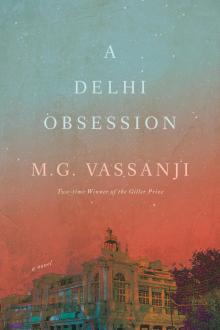 A Delhi Obsession
A Delhi Obsession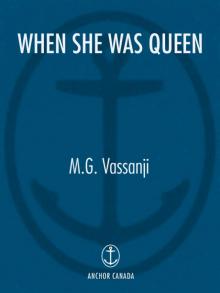 When She Was Queen
When She Was Queen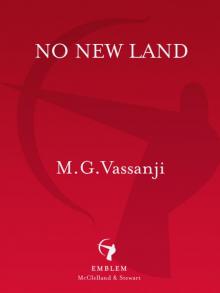 No New Land
No New Land Nostalgia
Nostalgia Mordecai Richler
Mordecai Richler The Book of Secrets
The Book of Secrets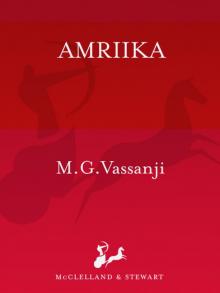 Amriika
Amriika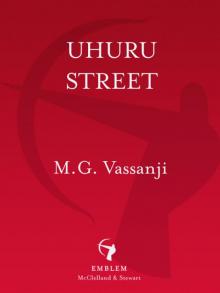 Uhuru Street
Uhuru Street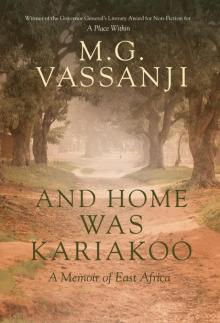 And Home Was Kariakoo
And Home Was Kariakoo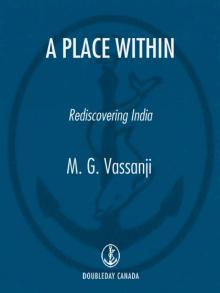 A Place Within
A Place Within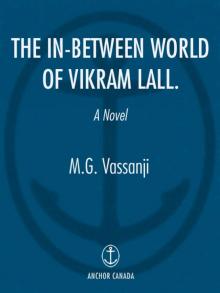 The In-Between World of Vikram Lall
The In-Between World of Vikram Lall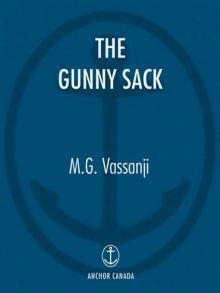 The Gunny Sack
The Gunny Sack